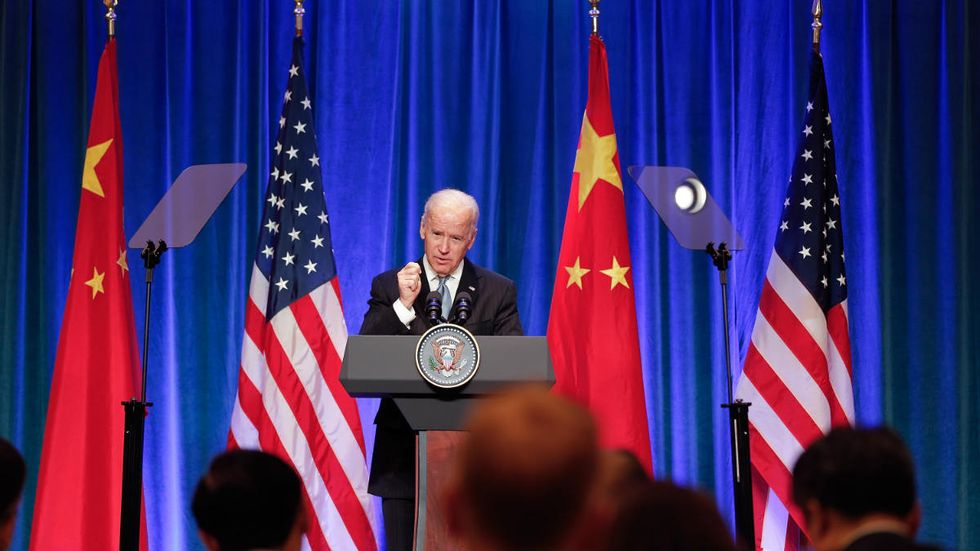
© 2024 Blaze Media LLC. All rights reserved.
Newly announced presidential contender Joe Biden has a massive conflict of interest — both in his personal and professional capacities — when it comes to dealing with America’s chief adversary, China.
The former VP made waves Wednesday when he appeared to refuse to categorize the nation of China as a U.S. competitor, let alone an adversary.
“China is going to eat our lunch? Come on, man,” Biden said at a campaign stop, adding, “They’re not competition for us.”
Biden’s wave-off of the China threat contradicts much of the data on the subject. According to some projections, China’s GDP will overtake that of the United States by 2030, or even sooner.
And much of Beijing’s success in catching up to the U.S. is credited to its theft of American intellectual property (IP), both in waging cyber warfare campaigns against our private sector and through stealing U.S. defense secrets. Each year, American businesses lose out on tens of billions per year thanks to Chinese IP theft, according to the U.S. International Trade Commission. Beijing receives a massive competitive advantage through this strategy, as it does not have to invest the billions necessary to build up its defense apparatus. China prefers to simply steal our military technology, which was developed with trillions of dollars on research and development costs through U.S. companies and government entities.
So why is Joe Biden so soft on China?
Some point to his family’s massive financial ties to Beijing. The Biden-China conflict of interest is perhaps best documented in Peter Schweizer’s Secret Empires: How the American Political Class Hides Corruption and Enriches Family and Friends. In the book, Schweizer details how the firm of Hunter Biden and John Kerry’s stepson received a $1+ billion private equity deal with Beijing.
And the money did not come from an American business that deals with China, but straight from the Chinese government, Schweizer explained. Over time, the deal’s value increased to $1.5 billion.
Adding to the questions surrounding the sketchy deal, the agreement was secured in December 2013, just 10 days after then-Vice President Biden and his son Hunter took an official visit to China.
The Hill reported on the deal’s national security implications:
Deals made by the firm — co-owned by the government of China and the two sons of top American officials — would go on to have serious national security implications for the United States. One such deal was with the automotive subsidiary of Aviation Industry Corporation of China (AVIC), a major Chinese military contractor accused of frequently stealing U.S. military technology.
In addition to his son’s corrupt dealings with China, Biden has always had a soft spot for Beijing, beginning with his first trip to the mainland in 1979. Over the course of his career, Biden has rarely critiqued Beijing, other than some meaningless rhetoric about generally improving their human rights practices.
In a 2011 op-ed for the New York Times titled “China’s Rise Isn’t Our Demise,” the then-vice president rejected the notion that China’s rapid economic development and expansion were a threat to the United States.
“I reject these views,” Biden said. “I remain convinced that a successful China can make our country more prosperous, not less.”
Sen. Marco Rubio expanded on Biden’s coziness with Chinese officials in a 2015 interview with radio host Hugh Hewitt.
“He’s got this personal friendship with the president of China that he brags about,” Rubio explained. “The guy who he told, basically, you know, we talk about human rights for domestic, political purposes, but we don’t really mean it,” he added, criticizing the Obama administration’s soft stance on China.
Over the course of the Obama administration, China grossly abused its cordial personal relationship with top members of the U.S. administration and continued its rampant theft and sabotage practices. On Obama and Biden’s watch, the Chinese government hacked the United States Office of Personnel Management (OPM), stealing records on over 21 million government employees. Beijing faced zero reprisal. China not only hacked government resources, but waged a massive cyber warfare campaign against major U.S. corporations. And between 2010 and 2012, the Chinese government went on a killing spree against American intelligence assets inside the country. The public news of the mass killings only came out after President Obama left office.
Biden’s long record of capitulating to China makes it quite clear that he is not willing to push back against Beijing’s continuing threats to U.S. sovereignty. Whether that has anything to do with his son’s $1.5 billion-plus financial windfall — thanks to the government of China — remains a mystery.
Unlike the Trump-Russia hoax perpetrated against candidate and then President Trump, Biden-China is a very real, established connection, one that should be understood as a potential national security threat.
#mc_embed_signup{background:#fff; clear:left; font:14px; }
/* Add your own MailChimp form style overrides in your site stylesheet or in this style block.
We recommend moving this block and the preceding CSS link to the HEAD of your HTML file. */
Want to leave a tip?
We answer to you. Help keep our content free of advertisers and big tech censorship by leaving a tip today.
Want to join the conversation?
Already a subscriber?
more stories
Sign up for the Blaze newsletter
By signing up, you agree to our Privacy Policy and Terms of Use, and agree to receive content that may sometimes include advertisements. You may opt out at any time.
© 2024 Blaze Media LLC. All rights reserved.
Get the stories that matter most delivered directly to your inbox.
By signing up, you agree to our Privacy Policy and Terms of Use, and agree to receive content that may sometimes include advertisements. You may opt out at any time.